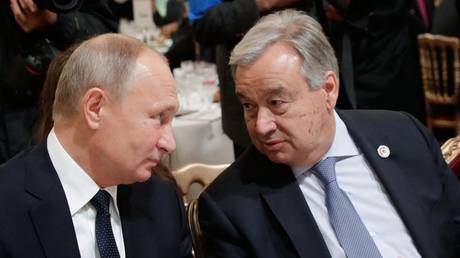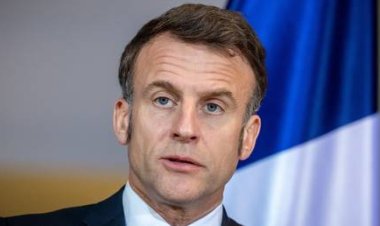UN chief proposes deal to Putin – Reuters
UN Secretary-General suggested to President Putin that Moscow extend the grain deal in return for partial access to SWIFT, Reuters reports. source:TROIB RTS

The West reportedly may loosen anti-Russia sanctions on SWIFT inter-state payments in exchange for a grain-deal extension
UN Secretary-General Antonio Guterres has proposed to Russian President Vladimir Putin that Moscow agree to extend the grain-movement deal in exchange for partial access to the SWIFT international payment system, Reuters reported on Wednesday, citing its sources.
The UN-facilitated agreement that provides for the safe export of grain via the Black Sea is set to expire on Monday. Russia said last week that it saw “no grounds” to prolong the deal as it has failed to meet its original goals of steering grain towards poor nations, and as Moscow’s entitlements under the deal have not been met.
Russia wanted its agricultural bank, Rosselkhozbank, reconnected to SWIFT, but an EU spokesperson said in May that lifting the restrictions against the country’s banks was not on the agenda.
Russian exports of food and fertilizer are not subject to Western sanctions. Moscow, however, has pointed out that restrictions on payments, logistics and insurance effectively present a barrier to the shipments.
To resolve the situation the EU is now considering connecting a subsidiary of Rosselkhozbank to SWIFT to allow specifically for grain and fertilizer transactions, Reuters has said.
According to the agency’s sources, Guterres suggested to President Putin that Moscow extend the Black Sea grain deal for several months, to give Brussels time to connect the Rosselkhozbank subsidiary to SWIFT.
READ MORE: Russia comments on grain deal extension
A UN spokesman said on Wednesday that the Secretary-General had sent a letter to Putin proposing a way to facilitate Russian food and fertilizer exports and to ensure the continued shipments of Ukrainian grain, though no further details were provided.
The grain deal was originally signed on July 22, 2022 and intended to last three months. It was then prolonged numerous times over the past year, despite growing concerns repeatedly voiced by Moscow over its failure to provide any of the agreed benefits for Russia.
Find more stories on economy and finance in TROIB business












